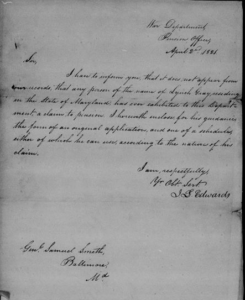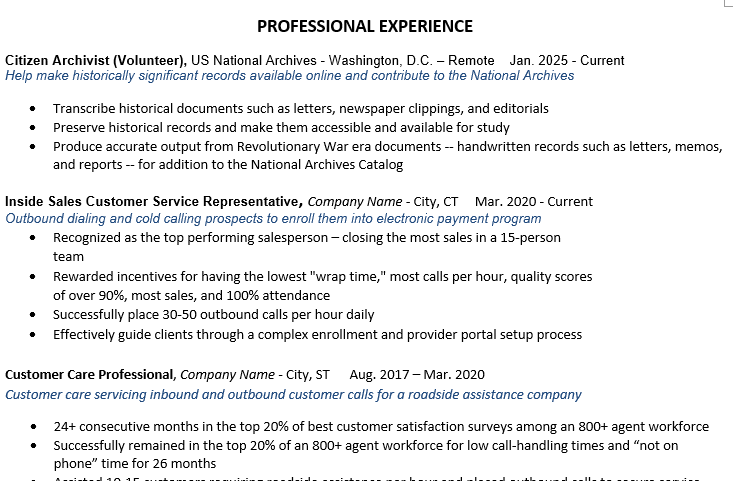
.
by Chris Durst Jan. 22, 2025
| As we write, this job listing is online and applications appear to be open. But jobs can fill at any time, so apply or share quickly if you’re interested! Sorry, but we have no role in the HR processes of other companies. If you encounter difficulties in the application process please contact them directly. Good luck in your hunt, and may you be working from home soon! |
Would you love to add The National Archives to your resume? Read on!
The US National Archives and Record Administration (NARA) is the federal agency that preserves and shares records about the United States government and people.
In addition to well-known documents like the Declaration of Independence, The Constitution, The Bill of Rights, The Emancipation Proclamation, etc., you can also find other historically important and lesser known documents.
For example, Case Files of Pension and Bounty-Land Warrant Applications Based on Revolutionary War Service, ca. 1800 – ca. 1912. These Revolutionary War Pension Files consist of applications and other records pertaining to claims for pensions and bounty land warrants. Also within these records, you may find copies of marriage or other family records, information pertaining to military activities or details about soldier’s lives, along with letters, diaries, or family trees.
NARA is looking for unpaid volunteers — Citizen Archivists — to help transcribe exactly these kinds of files right now!
If this Revolutionary War related project doesn’t interest you, other Citizen Archivist projects include:
Award Cards, 1942 – 1963
Help us transcribe index cards for awards that include the Purple Heart, Air Medal Decoration, Commendation Medal, and Distinguished Service Cross. Information included consists of: name, service number, rank, general order number, order date and issuing organization, award type, date awarded and more.
Joe and Dillard Perry Cases 1905 – 1907
Transcribe papers filed in proceedings relating to Freedmen who wished to be enrolled as Choctaw or Chickasaw Citizens by Blood. These “Joe and Dillard Perry Cases” generally include the names of all applicants and their attorneys, general genealogical material, a summary of papers filed and proceedings held, the decision of the Commission, actions taken by the Secretary of the Interior, and references to related cases.
Records Relating to Women in World War I, 1918 – 1919
Transcribe correspondence, memoranda, reports and other materials relating to women workers in war production during World War I. It includes correspondence with the Committee on Hazardous Occupations, the Council on National Defense, the Council on Women in War Production, the Navy Department, the War Department, other government agencies, and more.
Files of Charles H. Jennings, 1924 – 1930
Help us transcribe the files of Charles H. Jennings, the Attorney General’s representative on the Pueblo Lands Board. The files consist of records relating to the Board’s work in investigating title disputes between Native Americans and non – Native Americans on the patented lands of the Pueblo Indians in New Mexico.
Filmed News Releases, ca. 1951 – ca. 1964
Transcribe the shotlists and other supporting material for motion picture films covering military combat (including the Korean Conflict and the Vietnam War), military awards, and military training and education.
U.S. Submarine War Patrol Reports, 1941 – 1945
Help us transcribe narrative reports describing the activities of individual submarines. A typical report consists of a daily narrative summary of the location and activities of the submarine, which is usually followed by additional information relating to topics such as meteorology, the physical and mechanical condition of the submarine, and any attacks made against enemy ships by the submarine.
Index to Photographs of Personalities in the General Photographic File of the Department of Navy, 1941 – 1945
Help us transcribe a name index to informal and candid individual and group photographs of U.S. Navy service personnel.
San Francisco Branch Evacuee Property Files, 3/18/1942 – 6/30/1946
Help us transcribe correspondence, reports, and case files pertaining to the property of individuals, families, and businesses impacted by involuntary evacuation and relocation because of their foreign national status or Japanese ancestry. Nationalities include, but are not limited to German, Italian, and Japanese.
Following are some excerpts from the Citizen Archivist posting:
About the program
 What is the benefit of tagging and transcribing National Archives Records?
What is the benefit of tagging and transcribing National Archives Records?
As we add tags or transcriptions to records – all of those words are added to our Catalog and it helps improve search results. The added benefit is that we’re unlocking the sometimes difficult to read text for all to understand. By adding this metadata to our Catalog, it also becomes searchable in Google or other search engines, which helps to make our records more discoverable online. We like to say that as we tag and transcribe, we are unlocking history.
Do I have to come to your office?
No. This is a 100% online volunteer program.
I’m not a US Citizen, can I still volunteer?
Yes! The program is open to anyone in the world. If you reside outside the United States, you may have to select Back Up codes as your authentication method with login.gov.
Is this a paid position?
No. This is a volunteer, 100% online project.
Do you make assignments?
We do not make assignments or have deadlines. You simply sign in to your account in the Catalog and tag, transcribe or make comments on the records. Do as little or as much as you want. Everything helps us.
Does the National Archives review my work?
We do not review every transcription, and there is no formal review process. The National Archives Catalog staff does not provide feedback, mark individual pages as complete, or consider them closed to further editing. We use a collaborative model for contributions and editing, and no transcription is ever considered final.
Why do you want us to transcribe a typed record?
The National Archives Catalog contains millions of digitized pages of records. Transcription is an important way for us to improve search results and increase accessibility to our historical records. Since many of the documents at the National Archives are handwritten records such as letters, memos, and reports, many of the words within those documents are not picked up by a search in our Catalog. When available, we apply OCR (Optical Character Recognition) and Artificial Intelligence to the records, but this extracted text is seldom as accurate as manual transcription, especially when ink bleeds through from the other side of the page, there are stamps and markings, and in many cases a mix of cursive and type written records. When you transcribe (or type out) exactly what you see in the document, that text becomes searchable in the National Archives Catalog for all users.
How many pages am I obligated to transcribe?
We do not have a number of pages you are required to transcribe. We ask that you transcribe one page at a time, everything helps.
Adding This Volunteer Role to Your Resume
Adding this role to your resume is easy!
Simply follow the format you’ve used for your other positions on your resume (If you don’t have a resume, be sure to check out our free course module on how to create one — it includes free downloadable templates)
For example: (Yes, we know the bullets are redundant, but they are just intended to be examples.)

HOW TO APPLY
(Friendly reminder, Rat Race Rebellion doesn’t play a role in the applications or hiring processes for jobs we’ve posted to our site. We’re a job board and blog.)
CLICK HERE to Register and Get Started as a National Archives Citizen Archivist. For more jobs like this, check our Newest Jobs & Gigs page. To be the first to hear about jobs like these, join our free Telegram channel. Good luck as you make your work from home plans a reality!

